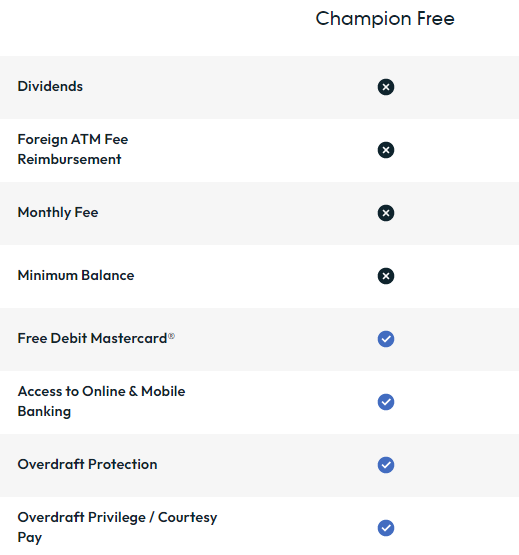Your credit score is often the basis for financial decisions that can impact your life. A high credit score will allow you to qualify for credit cards with low-interest rates and to get a loan if you need one. A low score may mean that you pay thousands of dollars more in mortgage interest than you might otherwise.
At Leaders Credit Union, we always want our members to be informed about what can affect their credit scores by being their financial champions. We are sometimes asked this question:
“Does opening a checking account affect credit score?”
Opening a new checking account is a big decision, so here’s what you need to know about the impact it may have on your credit score.
How Does Opening a Checking Account Affect Your Credit Score?
Many financial decisions can affect your credit score. You probably know that applying for a new loan or credit card will cause a temporary dip in your credit score. Late payments and other issues will also impact your score.
The good news is that, assuming everything is handled properly and with caution, opening a new checking account (or savings account) should not impact your credit score at all. Credit unions and banks do not require a hard credit pull to open a new account, and a soft credit pull has no impact on your score.
All you need to open a checking or savings account is a photo ID, your Social Security Number, proof of your address, and money for an initial deposit. If you’re joining a credit union, you may also be required to pay a small membership fee to open an account.
Do Banks Ever Require a Hard Credit Inquiry?
Most banks and credit unions don’t require a hard credit inquiry to open a checking account. However, the requirements might be different if you want to add overdraft protection to your checking account.
Since overdraft protection protects you against paying overdraft fees if you write a check that bounces, it increases the risk taken on by your financial institution. Some may choose to do a hard inquiry before offering you overdraft protection. If they do, you should expect a decrease of about five points in your credit score.
Is There Anything About Opening a New Account That May Impact Your Credit Score?
If opening a new checking account doesn’t affect your credit score, you might be wondering if there is anything associated with changing bank accounts that might cause issues that could lower your score.
The short answer is yes. When you switch accounts, particularly when you change from one financial institution to another, some things can go wrong that could impact your credit score negatively. Here are some examples:
- You empty your old account before all checks have cleared, resulting in an overdraft and a late payment that appears on your credit report.
- Your direct deposit goes to your old account instead of your new one, and you don’t have sufficient funds for checks to clear on your new account.
- You forget to switch your automatic payments to your new bank and end up with a negative account balance or multiple late payments as a result.
Fortunately, there are some things you can do to minimize the risks of these things happening.
Tips to Protect Your Credit Score When Opening a New Checking Account
Here are some tips to help you avoid issues when opening a new checking account and prevent the change from having a negative impact on your credit score.
Open Your New Account Before Closing Your Old One
The most important thing you can do is to open your new checking account before closing your old one. There’s going to be a transitional period where there is still activity on your old account and you want to make sure that you’ve covered everything before closing your account.
We suggest leaving your old account open until you’re sure that you’ve taken care of everything that might be connected to it and result in either a hit to your credit report or avoidable fees. You’ll need to keep an eye on the balance to ensure you have sufficient funds.
Make a List of Automated Payments and Subscriptions
The next step is to make a list of all automated payments and subscriptions associated with your old account. Many people have automated payments they’ve forgotten about and it’s easy to overlook one in the course of switching bank accounts—with the risk being that you won’t have sufficient funds to cover them.
Making a list will make it simple to contact each company or party one at a time and provide them with your new banking information. Once you have updated them with your new checking account, you won’t need to worry about missing payments or getting hit with overdraft charges.
Make a List of Uncleared Checks
On a related note, you should also make a list of any uncleared checks you wrote against your old checking account to make sure you know what’s outstanding and plan accordingly.
The key here is to keep enough money in your old account to allow all outstanding checks to clear. A failure to do so could mean late payments that could impact your credit score and overdraft charges that can affect your wallet, so don’t skip this step.
Switch Your Direct Deposit
Many people choose to have their paychecks deposited directly into their checking accounts because it means they get their money more quickly than they would if they had to deposit a check. It may also help them qualify for lower bank fees or higher interest rates or dividends since some credit unions and banks offer special deals for people with direct deposit.
If you plan to open a new checking account and have your direct deposit linked to your old account, you’ll need to go to your employer’s Payroll or Human Resources department to make the switch. In most cases, you’ll need to fill out a form and provide a copy of a voided check from your new account.
Keep in mind that it may take a while for the changes to take hold. Your employer should be able to tell you which paycheck will be deposited into your new account. If you are writing checks against your new account, you may need to transfer funds to make sure you have the money to cover them.
Update Bank Information with Cash Pay Apps
If you use PayPal or Venmo to send money to friends or receive money, then you’ll need to make sure to update any of the apps you use with your new checking account information.
Keep in mind that there may be a verification process involved, so the sooner you start this process, the better off you’ll be. You should receive confirmation that your account has been switched once you have verified your information.
Be Careful About Closing Your Old Account
The final precaution is to be careful about withdrawing funds and closing your old account. Depending on the type of account you have and who you’ve been banking with, there’s a risk that you could incur fees if you don’t handle things properly.
For example, if you have an account that requires a minimum balance, you can’t simply transfer your funds to your new bank account. Instead, you’ll need to make a formal request to close your account and ask your old bank to write you a check. That way, the account will be formally closed and you won’t need to worry about fees.
Does Having Multiple Bank Accounts Affect Your Credit Score?
You might also be wondering if having multiple checking accounts can impact on your credit score. The short answer is no, but here are a few things you should know.
First, having multiple accounts open can make it challenging to manage your finances and track your spending. While you’re in the transitional phase, you’ll need to stay vigilant and keep an eye on both accounts to minimize your risks.
Second, many financial institutions run a ChexSystems credit report before allowing someone to open an account. Your account history will show up on your reports. If you’ve taken the right precautions, nothing on your report should impact your credit score or your ability to open an account.
Finally, we want to note that it’s not a bad thing to have multiple bank accounts. Some people find it easier to save for specific goals if they have a separate account, and some prefer a joint account for shared expenses and a personal account for everything else. The most important thing is to understand the risks associated with having multiple accounts and develop a system that allows you to manage your money properly.
Open a New Checking Account with Leaders and Reap the Benefits
Opening a new checking account doesn’t need to be stressful. If you use the tips we’ve provided here, it should not harm your credit score. It may even help you identify subscriptions you no longer want or need and save some money.
Do you need a checking account with affordable fees and membership benefits? Leaders Credit Union is here to help. Click here to download of free checking switch kit and become a member today!










